Key takeaways
- Dexcom G7 uses a one-touch auto-inserter and tiny sensor designed to minimize discomfort during insertion.
- Factory calibration means no routine fingersticks are required for most users.
- Real-time glucose tracking helps you make proactive decisions without constant finger pricks.
- The sensor is water-resistant and designed for comfortable wear during sleep, showers, and exercise.
- QuickFill RX simplifies the prescription process with benefits investigation and prior authorization support.
For people with diabetes, frequent fingerstick testing can be uncomfortable and hard to maintain. Continuous glucose monitors (CGMs) like Dexcom G7 provide automated readings with minimal discomfort.
This article explains how Dexcom G7 achieves “test with no pain,” how it works, and how QuickFill RX helps patients start faster. You’ll learn about sensor placement, daily use, and data insights.
What is CGM and how it works
A continuous glucose monitor (CGM) tracks glucose levels automatically throughout the day and night using a small sensor placed under the skin. It sends readings wirelessly to a smartphone app every few minutes, showing trends and alerts for highs and lows.
This real-time data helps patients and doctors identify patterns and make informed decisions about food, activity, and medication timing.
Why painless glucose monitoring matters
Comfort affects how consistently people monitor their glucose. Pain and inconvenience often lead to skipped checks. Painless CGMs reduce discomfort, helping users stay consistent and engaged in managing diabetes.
A comfortable CGM like Dexcom G7 enables continuous tracking during daily activities, improving awareness and overall quality of life.
How Dexcom G7 achieves “test with no pain”
Dexcom G7 uses a one-touch auto-inserter that places a thin filament under the skin in one quick motion, minimizing discomfort. Its compact design stays comfortable even during sleep or activity.
Factory calibration means most users never need daily fingersticks. After a short warm-up, the sensor delivers accurate real-time readings without manual calibration.
Tip: Rotate placement areas and allow skin to rest between sensors for long-term comfort.
Sensor placement and daily use
Dexcom G7 is worn on the back of the upper arm for up to 10 days. It’s water-resistant for showers, swimming, and exercise.
Its low-profile design is discreet under clothing, and the adhesive is secure during daily wear. If irritation occurs, consult your provider about alternative sites or skin prep methods.
Tips for comfortable wear
- Clean and dry the insertion site before applying the sensor.
- Avoid areas with scars, moles, or irritation.
- Rotate placement sites to let skin recover between sensors.
- If adhesive loosens, use skin-safe adhesive patches made for CGM use.
How to get started with Dexcom G7 through QuickFill RX
QuickFill RX simplifies the process of starting Dexcom G7 by handling insurance and prescription logistics:
- Complete an online form — Submit your prescription and insurance details via QuickFill RX.
- Benefits investigation — The team reviews your coverage, estimates costs, and finds co-pay programs.
- Prior authorization support — If required, QuickFill RX coordinates paperwork with your provider and insurer.
- Shipment to your door — Once approved, supplies are delivered with ongoing refill coordination.
QuickFill RX provides [benefits verification], [authorization assistance], and [coverage support] to reduce delays and costs.
Frequently asked questions
This article is for educational purposes only and is not a substitute for professional medical advice.

